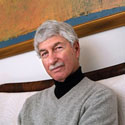Poetry and Politics
Lybian poet Khaled Mattawa weighs in on the revolution
February 23, 2011 Khaled Mattawa was thirteen when Muammar Gaddafi’s forces began hanging “traitors” in Mattawa’s home city of Benghazi. The next year Mattawa left his native Libya, accompanied only by his eighteen-year-old brother, to move to the U.S., where opportunities were plentiful and dictators were conspicuously absent. Mattawa’s parents and four younger sisters stayed behind. Because of Gaddafi’s suspicion of ex-pats, Mattawa could not return. He didn’t see the rest of his family again for twenty-one years.
During those years, Mattawa graduated from the University of Tennessee in Chattanooga and studied creative writing at the University of Tennessee in Knoxville. He has since gone on to become an associate professor at the University of Michigan, a translator, and a nationally-decorated poet who writes not in Arabic but in English. This week Mattawa has assumed yet another role: media commentator. According to The Daily Beast, he has set up “a makeshift situation room in his Michigan basement, from which he supplies information to reporters and fellow Libyans.” Libya, unlike Egypt, is not a web-powered uprising, he told the Beast: “This isn’t a Facebook revolution. It’s more like Holler—people calling to each other from the other side of the street.”
Mattawa has been waiting most of his life to see Gaddafi deposed, and he is convinced that moment has finally come. “I think the regime is over even if Gaddafi manages to survive,” Mattawa told Democracy Now. “Libyans are saying, ‘Yes we will have a new constitution, perhaps we will have a new flag. But we do not want you or your father or the rest of your plan, so get out of here.'”
“This is the moment we’ve been waiting for,” he said in an interview with Mother Jones. “Everything good about Benghazi that I know has appeared in the last few days.”
March 2, 2011 update: In an interview with Guy Raz for the weekend edition of NPR’s All Things Considered, Mattawa remembers his home town: “I feel rebirth, greatly honored to be from Benghazi. I feel slightly ashamed at having distrusted the people or my fellow citizens at not being able to rise. And I feel a great sense of solidarity with the people of my city. I’m overjoyed.” Listen to the full interview here.
March 27, 2011 update: Democracy Now recently invited Mattawa to debate Asli Bali, an international law professor at the UCLA School of Law, on the subject of military intervention in Libya. “As to peacekeepers becoming involved at this point, I think that would be a good thing,” Mattawa argued. “You know, if we can have somehow to force Gaddafi to release the thousands of people he has detained in Tripoli, many of whom are being tortured as we speak, any of those contributions to loosening Gaddafi’s grip on the population and actually letting this transformation occur peacefully, that would be a good addition to the process. But at this point, I think what is being done in breaking down the Gaddafi’s military capabilities is very good. I say this as a Libyan. And as I see these bombardments happening, I see my country’s money being burned. And I’m very concerned about the loss of resources. And as far as I know, the loss of lives has been basically focused on those who are in Gaddafi’s military. So that’s unfortunate, too. A lot of these people have really maybe not have decided to join his military cause with much of their own decision making involved. But Gaddafi is a monster. He really needs to be—his regime needs to crumble.”
As for the question of whether these peacekeepers should attempt not only to stop the bloodshed but also to remove Gaddafi from power, Mattawa asks, “Well, what is the alternative? I think it is a reluctant decision, but what is the alternative? Is the alternative to maintain Muammar Gaddafi in power? What is going to come after Muammar Gaddafi? You saw that really what was—the way he is running the country now, it is him, his two of his sons or three sons running the country, and one or two or three aides that are speaking to the press. And that’s it. We don’t really have a state. Where is the prime minister? Where are the—where is the cabinet? Where is the state’s structures that he supposedly had in place? Why aren’t they rising to speak on his behalf? My understanding is that his cabinet are under house arrest, and some of them are kept near him in Bab al-Aziziya. This guy does not have a state anymore.” To read the full debate, click here.
April 5, 2011 update: In a Reuters news article, “Libyan-American poet drops caution, speaks out”, Holly Arida, who coordinates a regular conference on Arab-American arts and literature called DIWAN, said Mattawa “embodies the spirit of the Arab American artist/activist.” She also praised his “heartfelt concern for his Libyan homeland and the thirst for accurate knowledge in America.”
To read Mattawa’s poem, “Now That We Have Tasted Hope,” click here.
For more updates on Tennessee authors, please visit Chapter 16‘s News & Notes page, .

